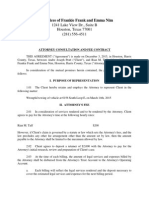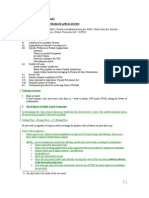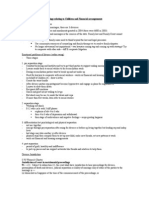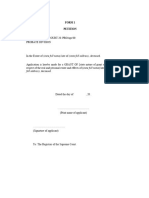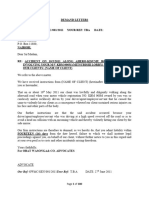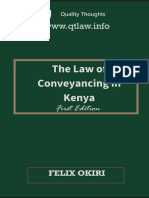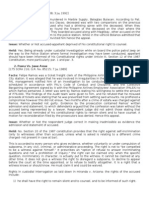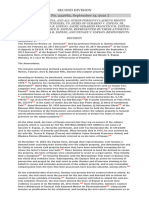P& A Final
P& A Final
Uploaded by
felixmuyoveCopyright:
Available Formats
P& A Final
P& A Final
Uploaded by
felixmuyoveOriginal Title
Copyright
Available Formats
Share this document
Did you find this document useful?
Is this content inappropriate?
Copyright:
Available Formats
P& A Final
P& A Final
Uploaded by
felixmuyoveCopyright:
Available Formats
1
1.0 INTRODUCTION.
A grant of probate can be both contentious1 (probate in solemn form) and
non-contentious. (Probate in common form).it is said to be contentious when
there is a dispute as to the following;
a) Validity of a will,
b) Entitlement of grant
c) Action being taken against grant made under common form and
d) Where probate of a lost will is sought.
These are common in relation to making or confirmation of grant,
revocation of grant and family provisions. In non -contentious probate, there
is no dispute at to the documents being lodged and as such, there is rarely
any hearing or court attendance.
Before lodging of an application for grant, there are several other acts or
omissions that may occur. For instance or administrators as the case may
be, may refuse to take up grant when and if cited, they may renounce the
will, some of the beneficiaries may refuse to give consent to an
administrator appointed to apply for grant among others. Meanwhile, we
shall be looking at application that may arise at pre- application of grant
stage.
1.1 Applications at the pre-application of grant stage.
a) Renunciation.
Renunciation applications are provided for under part V of probate and
Administration Rules that is Rule 18- 20.An executor or an administrator
as the case may be, may opt to decline applying for grant. The
renunciation has to be by writing signed by a person entitled to apply or
orally declared in an open court. This not a hard and fast rule in the
sense that renunciation of grant can be done before application of either
grant or even after issue of grant. Once made, it cannot be retracted
except by order of court. However, an intermeddler 2 of the estate of the
1
Contentious probate means that parties are in disagreement with regard to who is to be
the personal representative of the estate of the deceased.
2
Section 45 of the Act provides No intermeddling with the property of the deceased
person.
deceased cannot renounce grant3, particularly because this could be
seen to defeat the doctrine of relation back, which seeks to protect the
estate of the deceased from harm.
b) Citations.
A citation is a command by a court to a person who is entitled to apply for
grant ordering him or her to apply the same within a specific period.
Citations are provided for under rules 21-24 of probate and Administration
rules. The applicant (citor) swears an affidavit (Form P&A 20 -24)4 asking
the registry to issue a citation. This is done after the payment of a
prescribed fee. If there are good grounds the registrar signs the citation
and cause it to be served on the person cited (citee). The citee must enter
appearance within 15 days by filling Form 275 the form has to support by
an affidavit. The citee may accept or refuse to take grant, if the cite accepts
to take grant he must fill the petition for application of grant. Having said
that, there are grounds that may necessitate or prompt an application for
citation based on the following grounds:
i.
ii.
Where a person who is entitled to apply or take grant in testate or
intestate delays or fails to apply for grant or he or she may be cited to
apply for grant.
Where a person with an equal priority refuses to give his or her
consent to another person of an equal priority to apply for grant.
iii.
Where a person has refused to give consent to the mode of
distribution of the estate of the deceased. And-
iv.
Where a purchaser or creditor is owed money by the estate.
1.2
Types of grants.
The manner in which the deceased dies determines the type of grant to be
sought. Depending on how the deceased died and left his affairs, different
applications of grant have to be applied for. In order to understand this we
Miss Rutos class notes on 40 types of limited grants p.1
Rule 21(2) of probate and Administration Rules.
Ibid 4 ,Rule 21(5)
shall examine each type of grant and circumstances or situations in which
they occur. We have different types of grant namely;
a) Grant of probate.
b) Grant of letters of administration with letters annexed.
c) Grant of probate of proof of oral will.
d) Grant of letters of administration interstate.
e) Resealing ( foreign grant) and
f) Limited grants.
We shall now be looking at each type of grant, when it is sought, the
application to filed in each grant and the procedure to be followed.
2.0. APPLICATION FOR GRANT (GRANT OF PROBATE).
Application for grant is guided for under section 51 of the law of succession
and rule 7-14 of the probate and administration rules. The provisions set out
what must be contained in the forms or applications to be lodged with the
registrar.
It is usually granted in situations where the deceased dies and leaves
behind a written will and he names his/her executor (s) to be in charge of
his affairs. Appointment under a will is made pursuant to section 6.6 In
addition, states persons who qualify to be appointed as executors to include,
spouses, advocates, banks/creditors, friends and the public trustee.
Confirmation and application is usually done or made under section 53 (a)7
where the testator has left a written or oral will.
6
7
Section 6. A person may, by a will, appoint an executor or executors.
Section 53 (a) provides that a court may_
a) Where a deceased person is proved ( whether by production of a will or an
authenticated copy thereof or by oral evidence of its contents ) to have left a valid
will, grant, in respect of all the property to which the will applies eitheri.
Probate of the will to one or more of the executors named therein; or
ii.
If there is no proving executor, letters of administration with the will annexed;
and
b) If and so far as there may be intestacy, grant letters of administration in respect of
the intestate estate.
The effect of grant of probate is that, it acts as proof of terms and proper
execution of the will.it also confirms executor authority to act. The title
becomes and his duties after the death of the testor.
Persons entitled to apply are the persons and only persons expressly
appointed or named in the will as a general rule. Section 60 provides that
where a will appoints more than one executors, they are all granted
simultaneously8. Accordingly, rule 25(b) provides for the number of
executors to be appointed in a will and states that it should be one person
or two but should not exceed four.
Where the executor or executrix intermeddles with the estate of the
deceased between the date of the death of the deceased and the date of
grant, the principle of relation back will then apply, this seeks to prevent the
estate of the deceased against harm 9.
Of importance to us is the stage at which this application is made.
Application for grant comes at least three months from the day of the death
of the testator.comfirmation of grant is made if the registrar, the judge and
all the parties are satisfied that the grant be made to the applicant. This is
usually the very first step in both contentious and non-contentious probate.
2.1. Forms and documents required Requirements.
a) Form P & a 78 (petition).
b) Form P & A 3 (Affidavit).
c) The original will
d) Two photocopies of the will
e) Death certificate.
f) Letter from the chief.
2.2. Procedure for application of grant.
I.
The executor named in the will, applies for grant of probate unless
he refuses or declines to apply. This is done three (3) months after
the death of the deceased.
Section 60. When several executors are appointed, probate may be granted to them all,
simultionouesly, or at different times.
9
W.Musyoka, law of succession, 4th ed, p. 256
II.
The executor files the following forms with the courts deputy
registrar in the high court registrar, district registry or principle
registry, a petition and an affidavit, attach the original will, two
photocopies of the will and the original death certificate and a
letter from the area chief.
III.
When the deputy registrar is satisfied that all the documents are in
order, it is then placed before the honorable judge.
IV.
The judge gives orders to the effect that the matter be advertised
in the Kenya gazette.
V.
VI.
If no objections are raised within thirty (30) days, letters of probate
are issued.in the letters, they attach the will, three copies of the
will attached duly sealed with the ribbon.
After a period of six (6) months, parties go for the confirmation of
grant.
3.0 GRANT OF
ANNEXED.
LETTERS
OF
ADMINISTRATION
WITH
WILL
This type of grant applies when, the deceased dies and leaves behind his
will but has not named the person who should handle his affairs or
executors, the executor appointed has pre-deceased the testor, where the
appointed executor has renounced executorship and where the executor is
cited to take out a grant of probate and has failed to do so (failed to apply
for grant).
Any beneficiary can apply for grant of letters of administration with will
attached. Finally, it can also be issued where the executor had failed to
apply or act for whichever reason failed to apply.
The persons entitled to grant of letters of administration with letters
annexed include in order of priority.
a) The universal or residuary legatee.
b) A personal representative of the deceased residuary legatee.
c) Public trustee or trust corporation and
d) A creditor/ bank by virtue of section 6510 of the Act.
10
3.1
Forms and documents required Requirements.
a)
Form P & A 78 (petition).
b)
Form P & A 3 (Affidavit).
c)
The original will
d)
Two photocopies of the will
e)
Death certificate.
f)
Letter from the chief.
The effect of grant of probate with letters annexed is that it acts as
conclusive proof as to the terms of the will and that the will had been duly
executed. Besides, it confers authority on the administrator and vests the
deceased property on him.
The principle of relation back does not apply to the grant of letters of
administration with will annexed.
3.2 Procedure for applying letters of administration with will
annexed.
The executor files the petition affidavit forms attach the original will, two
photocopies of the will and the death certificate and a letter from the area
chief.
If all the documents are in order, the file is placed before the judge by the
deputy registrar.
The judge gives orders that the matter be advertised in the Kenya gazette.
If no objection is raised with 30 days, letters of grant of probate are issued.
The confirmation of grant made after the lapse of six (6) months.
4.0 GRANT OF PROBATE OF PROOF OF ORAL WILL.
Where a person dies under customary law gives an oral will and dies within
three months, the beneficiary can apply for grant of probate of proof of oral
will. The same has to be made before two or more competent
witnesses11.their details; names and addresses must also be furnished.
5.0 GRANT OF LETTERS OF ADMINISTRATION INTESTATE.
11
Section 9 of the Law of succession Act.
A person who dies having not written a will or given instructions as to what
should occur to his or her property the letters may be sought and granted
accordingly.
Any person may apply for letters of administration intestate e.g. applied
first by a person who is a survivor and in order of consanguinity (i.e. wife,
husband, children, parents, brothers, and sisters etc.)
5.1 Forms and documents required Requirements.
The person applying for letters of administration intestate should file the
following;
a) Form P & A 80 (petition).
b) Form P & A 5 (affidavit).
c) Form P & A 11 (affidavit of justification of proposed sureties).
d) Form P & A 12 (affidavit of means).
e) Form P & A 57 (guarantee of personal sureties).
f) Death Certificate (mandatory).
g) A letter from the chief
h) A certified consent of all the beneficiaries.
6.0 RESEALING/ FOREIGN GRANT.
Resealing is provided for under rule 42 (2) of probate and Administration
rules. Resealing contemplates a situation either where a testator is a
foreigner and has property in Kenya or where a Kenyan dies and has
property abroad.
In an instance of a foreigner, dying abroad and has property in Kenya, a
grant is applied in his country and brought to the high court of Kenya for
resealing.by this we mean that the normal procedure is of gazettement is
followed.
Should the deceased be a Kenyan domiciled abroad and has property in
Kenya and vice versa, the same procedure is followed?
6.1 Documents and forms required.
a) Form P & A 81 OR P & A 82 (petition)
b) Form P & A 7 (affidavit)
c) Certified copy of the grant issued by foreign country. (In the
alternative, it can be notarized.)
6.2 The same procedure is followed in resealing Just as in formal grant.
7.0 LIMITED GRANTS.
There are more than forty types of limited grants but for purposes of this
discussion, we shall be discussing the most common ones and the
circumstances under which they apply. However, section 54 of law of
succession Act provides that a court may issue limited grants of
representation in different circumstances.12 The list is long under the fifth
schedule. We shall only look at the main ones and those that are common.
7.1 Limited grant (ad colligenda bona)
This type of grant sought and or issued to ensure that the estate of
the deceased is preserved and does not go to waste13.it is meant to
give the administrator power to collect and preserve the estate of the
deceased before full grant is sought and issued. Ad colligenda means
collecting and ad colligenda bona defuncti means for collecting the
goods of the deceased.14 This type of grant is provided for under Rule
36(1) of probate and administration rules and its meant to enable the
administrator do things like pay rents, school fees for children of the
deceased among other duties pending the making of full grant.15
Forms and documents to be filled
a) Form P & A 85 petition.
12
Section 54 of the law of succession Act. A court may, according to the circumstances of
each case, limit
a grant of representation which it has jurisdiction to make, in any of the
Forms described in the Fifth Schedule.
13
Mary Angawa, procedure in the law of succession, (2011) law Africa p.16
14
Miss Ruto notes, Different types of probate p.1
15
Rule 36 (1) provides Where, owing to special circumstances the urgency of the matter
is so great that it would not be possible for the court to make a full grant of
representation to the person who would by law be entitled thereto in sufficient
time to meet the necessities of the case, any person may apply to the court for
the making of a grant of administration ad colligenda bona defuncti of the estate
of the deceased.
b) Form P & A 19 petition.
c) Copy of death certificate.
d) Letter from the area chief.
After lodging all the forms and papers at the registrar, the
registrar inspects them and once satisfied that they are in order,
he places it before the honorable judge at the high court who
then who then issues orders accordingly. There is no
requirement as to advertising.
7.2 Grant ad litem.
It is granted to enable the personal representative of the deceased to
sue on behalf of the estate or defend the estate where the estate has
been sued.one needs to fill forms P &A 90B and 19,( petition and
affidavit ),death certificate, letter from the chief highlighting the
beneficiaries of the deceased, consents from other beneficiaries, the
name of the person to be sued should be clearly stated, evidence of
cause of action if possible, name and address of the petitioner,
domicile of the deceased, date of death of the deceased and the
relationship of the petitioner and the deceased.
Once that is done, the registrar paces the file before a judge who
then issues the grant.
7.3 Grant pendete lite.
In this type of grant, the administrator is appointed by the court
particularly where the will of the deceased is being contested. The
court appoints the administrator to prevent the estate from going into
waste. This type of grant is terminated once the pending proceedings
is terminated. To apply, the applicant fills Form P & A 90 and 19, a
petition and an affidavit respectfully, in this type of grant one is
required to appear before the judge.
7.4 Grant de bonis non adminstratis.
This type of grant is issued where the executor or administrator have
died or for whichever reason they are unable to administer the
estates of the deceased.in a situation where the estates of the
deceased have been left administered, a person will be appointed to
complete the administration of the estate. The applicant fills forms P
& A 86 and 87 and 19. Form 86 where the deceased died intestate
10
and form 87 where he died testate. Details required include, name of
the petitioner, date of death of the deceased, domicile of the
deceased, name of the administrator to be replaced, consent from
other beneficiaries, date of letters of the administration issued.
7.5 cessate grant.
This type of limited grant issues where the original issued grant was
limited as to time and that the time in question has lapsed leaving the
estate of the deceased unadministered.
7.6 Temporary grant by a resident magistrate.
It is provided for by section 49 of the Act16.it is issued by the
magistrate. This type of limited grant is similar to ad colligenda bona
defuncti grant in so far as the collection and preservation of the
estate of the deceased is concerned except that in addition to that,
the holder has authority to pay debts.
7.7 grants limited as to property.
It is provided for under paragraph 1317 of the 5th schedule.it may be
granted where the testator has appointed executors only for certain
assets in certain areas. For example in Nyeri or Eldoret.it also applies
where the deceased is domiciled elsewhere but has property in
Kenya. A grant will be issued limited to that property in Kenya.
7.8 grants limited as to time.
This is provided for under paragraph(s) 1- 10 of 5th schedule and
section 45 of the Act. They are several issued under different
circumstances.
a) Grant durante aetate minore
16
Section 49 (iii) a resident magistrate shall have jurisdiction, in certain matters of agency
to issue temporary grant for purposes of collection and preservation of the deceased and
payment of debts.
17
5th schedule para 15, provides limited grant to property to an interested party who has a
beneficial interest.
11
Its taken out where the executors or administrators are minors and
are not entitled to grant as their own right. The grant expires when
the minor reaches the age of majory or some other time the court
may order so.
b) Grant durante absentia.
Where the personal representative is outside the jurisdiction,
the court may grant of representation to another person for the
duration that the personal representative shall be away. The
limited grant shall expire on return of the holder of the grant.
Paragraph, 4, 5, and 6 of the 5th schedule.i8n the aforesaid
paragraphs, an attorney takes out the grant in absence of the
executor or administrators.
c) Grant where will is unavailable.
Where the testator has made a will but the same, is lost, or
misplaced or unavailable for whichever reason a limited grant
may be issued until the original will is found or a more
authentic is found or availed.
d) Administration for use and benefit of a person of unsound mind.
Grant limited to the duration of insanity, disability or mental
incapacitation of a solely entitled in intestate. Issued where the
estate of the testator.
e) Temporary grant limited to collection of assets and payment of
debts.
This is provided for under S 49 of the LSA and rule 37 of the P
& A Rules. It is related to the grant ad colligenda bona, the only
difference between them being that the limited grant under S
49 goes beyond collection of assets to cover payment of debts.
It is made pending the making of a full grant.it is similar to
grant by a resident magistrate.
f)
Special limited grant LN No. 39 of 2002 made in special
circumstances where the urgency of the matter is so great that
the court cannot make a full grant within sufficient time.
12
8.0 CONFIRMATION OF GRANT.
Confirmation of grant takes place six months after the issue of letters of
grant. This is provided for under section 71 of the Act (substantive law) and
Rule 40 of probate and Administration Rules, which set out the procedure to
secure confirmation of grant. . Of importance to note, is that the six month
period enables the holder of grant of representation to collect all the assets
or create an inventory of all the assets of the estate of the deceased and
his/her liabilities, identify all the beneficiaries entitled to the share of the
estate of the deceased, and the mode of distribution of liabilities and assets
of the deceaseds estate and identification of all accounts of the deceased.
In an instance where the holder of grant of representation has failed or
neglected to apply for confirmation of grant within one year the court will
issue notice to the holder to apply for confirmation of grant.18
The holder of the grant in either situations will apply to the court for
confirmation of grant. This empowers him or her to distribute the capital
assets of the deased.
I.
Where a grant has been issued for a will, forms 108 and 8 are
filled.
II.
Where a grant has been issued for letters of administration with
will annexed, the same forms apply as in II above.
III.
Where a grant has been issued with letters of administration
Intestate form 108 (application) and form 9 (affidavit) are filled.
IV.
Where a confirmation is required within six months under
section 71 (3) of the Act, forms 109 (application) and form 8 or 9
Affidavit or whatever is applicable.19 This contemplates a
situation where a court issues confirmation of grant if and when
satisfied that all dependents do not fall under section 29 of the
Act20, and are of full age and consent to the application and that
it is expedient in the circumstances of the case to do so.
The difference in forms for letters of administration is that the forms must
disclose the appointment of each survivor who is entitled to the said estate.
18
Section 73.
19
Ibid (9) p.19
20
Section 29 of the law of succession Act defines dependents within the meaning of the act.
13
Before making of grant, rule 40 of probate and administration requires that
close relatives of the deceased that the deceased supported must be
mentioned in the application.21Additionally all the assets of the deceased
must be provided for, mode of distribution outlined, consent from all
beneficiaries consenting to the mode of distribution and the liabilities of the
deceased must also be set. Once the registrar is satisfied that the forms of
application are in order, he fills form 111 and sent it to the caveator
warning of the pendency to confirm grant for him to take any appropriate
action if any. Where there is no caveat lodged he proceeded to set a hearing
date, and the judge on being satisfied will confirm the grant22.the caveat
holder is supposed to file an affidavit of protest within 15 days failure of
which the caveat ceases to have any effect on the confirmation of grant.
Alternatively, any person may file an objection in protest of confirmation of
grant by filing form 10 (affidavit of protest) stating grounds for his or her
objection.23in the matter of Mary Gachuru Kabogo (deceased) succession
cause No.2830 of 2001 Justice Angawa, noted that in contested cases,
where a caveator, a protestor or an objector, or it could be one of the
beneficiaries declining consent, they are required to file relevant forms and
proceed for hearing during the application for confirmation of grant in any
of the above scenarios. She set out the procedure for disposing out such
protest and went ahead to clarify that if the dispute is with regard to a
certain property then the undisputed property should be confirmed and the
disputed property goes for full hearing.
However, its worth noting that confirmation of grant may be declined in
certain circumstances namely;
a) Where there is pending application as to the reasonable
provisions of any dependent left out or not adequately been
provided for, in the will or intestacy.24in which the court may
invoke its discretion and provide that the left out dependant be
given a share of the deceaseds estate out of the net estate, it
could be by way of periodical payments or a lump sum.25
21
Ibid (10) at p.8
22
Rule 40(5) of probate and administration Rules.
23
Ibid Rule 40(6)
24
Part III of the Act.
25
Supra, section 27
14
b) Where the estate duty has not been paid and the certificate of
estate duty issued by the commissioner26.
9.0 RECTIFICATION/ALTERATION OF GRANT
A grant may be rectified by the court to correct errors. This provided
for by Section 74 of the Law of Succession Act,27
Therefore, rectification of grant may be done where errors are
superficial in nature, however, fundamental errors tending to change
the character of the grant cannot be rectified, and instead the grant
should be revoked altogether.
In the matter of the Estate of Muniu Karugo (Deceased), the intestate
was the father of two administrators, a brother, and a sister.
Rectification of the confirmed grant was sought by the brother
alleging that the confirmation introduced the name of a third
beneficiary who was not entitled to a share in the estate. The court
dismissed the application on the grounds that rectification seeks to
deal with obvious errors, and it cannot be used to fundamentally alter
the mode of distribution of the estate.
In Kamau v. Kirima Khamoni J stated that Where a confirmed
beneficiary dies, the right procedure to replace him as a beneficiary, is
not by rectification of the grant, but by first obtaining a grant of
representation to his estate and thereafter seek rectification of the
confirmed grant in the first estate to replace the original beneficiary
with the administrator of the estate.
10.0 REVOCATION OF GRANTS
A grant of representation may be annulled or revoked by the court
suo moto (on its own motion) or on application by an interested party
pursuant to section 76 28of the Law of succession Act as read together
26
Section 72 of the Act.
27
Section 74, Errors in names and descriptions, or in setting out the time and place of the
deceaseds death, or the purpose in a limited grant, may be rectified by the court, and the
grant of representation, whether before or after confirmation, may be altered and amended
accordingly.
28
Section 76 of the law of succession Act provides A grant of representation, whether or not
confirmed, may at any
time be revoked or annulled if the court decides, either on application by
Any interested party or of its own motion.
15
with rule 44 of probate and Administration rules. Once a grant has
been issued, no objection can be lodged or entertained by the court
except by revoking the grant. The grounds for which a grant can be
revoked include;
a) Where the proceedings are defective in substance for example where
the will was obtained by fraud or undue influence. For example, In
the Matter of the Estate of Karanja Gikonyo Mwaniki
(deceased) Nakuru HCMisc. 245 of 1998 the court on its own
motion, in keeping with S 76, of the LSA, revoked a grant in, because
the proceedings to obtain it were defective. The grant had been issued
by a Resident Magistrate in respect of an estate whose value was
Kshs. 240 000.00. Ondeyo J held that the Resident Magistrate had
not jurisdiction to make the grant since his jurisdiction was limited to
an estate whose value did not exceed Kshs. 100 000.00 29.
Similarly, In the Matter of the Estate of Mwaura Mutungi alias
Mwaura Gichigo Mbura alias Mwaura Mbura (deceased)
Nairobi HCSC No. 935 of 2003 grant was revoked because the
grantee had failed to notify the applicant of the petition and to obtain
his consent.
Finally, In Musa vs. Musa (2002) 1 EA 182 it was held that the
letter from the chief and the sureties are not mandatory requirements
whose absence would affect the status of a grant. Grant was however
revoked on other grounds i.e. on the basis of S 58 where, when
survivors of deceased are minor, the grant should be made to the
surviving spouse jointly with another person; in this case, the grant
was made to one person hence inconsistent
b) Where a grant has been obtained by making of false statement or
untrue allegations of fact. In Samwel Wafula Wasike vs. Hudson
Simiyu Wafula CA No. 161 of 1993, it was alleged that the
appellant had deceived the court when he stated in his petition that
29
Section 48 (1) a resident
magistrate shall have jurisdiction to entertain any application other than
an application under section 76 and to determine any dispute under this
Act and pronounce such decrees and make such orders therein as may
be expedient in respect of any estate the gross value of which does not
exceed one hundred thousand shillings.
16
he was a grandson of the deceased. The deceased was in fact not his
grandmother, but a sister of his grandmother. The persons who had
prior right to the grant had not given their consent. It was held that
the grant had been obtained fraudulently by the making of a false
statement and it was revoked
c) Concealment of material facts for instance where the beneficiary has
been excluded from the petition. . In the Matter of the Estate of
Robert Napunyi Wangila Nairobi HCSC No. 2203 of 1999, the
sister of the deceased applied for and obtained letters of
administration. She didnt disclose in her petition that the deceased
had died testate and that a grant of probate had already been issued
to the executors. Her grant was revoked on application of the
executors.
d) The holder of grant has failed to apply for confirmation of grant within
a year.
e) Lack of diligence on the part of the executors or administrators in
failing to provide accounts among others. Failure to produce into
court accounts or inventories as may be required of them are the
other ground for revoking a grant. In the Matter of the Estate of
Mohamed Mussa (1997), the grant was revoked because the
administrators had not kept any records of accounts of their
administration and one of the administrators was not capable of
discharging her duties on grounds of poor mental health and old age.
10.1 Procedure for applying for revocation.
i.
The aggrieved party or applicant would fill forms P & a
107 (summons) and 14 (Affidavit) at the high court
registry.
ii.
Once the application has been received, the registry sends
form P & A 68 (Notice) informing him of the revocation
Application and inviting him to file an application to
oppose the application.
iii.
Similarly form P & A is sent to the applicant informing him
to appear before a judge for directions after which the
matter then proceeds for hearing.
However, a court may suo moto revoke a grant. Where it does so it has to be
on grounds set out under section 76 of the Act, this position is affirmed in
17
Isabella Gichugu Matheka and another vs. Eric Muthui Matheka
Nairobi (2002) the Court of Appeal of Kenya held that the HC was not
entitled to revoke a grant on grounds other than those set out under S 76
where it had done the same on its own motion. When revoking the court,
gives notice by filling Form P & A 69 and serves it to all parties concerned
to inform them of the revocation.
10.3 courts discretion.
The court is not bound to revoke any application sought to revoke a grant
by virtue of section 76 of the Act. In invoking its discretionary powers, the
court can make any such orders, as it thinks fit paying due regard to the
facts, circumstances and the merits of each case. In Kipkurgat arap
Chepsiror and others vs. Kisugut arap Chepsiror CACA No. 24 of
1991, the court declined to grant the prayer for revocation, but instead
entered the names of the applicants in the grant as beneficiaries. They had
sought an order of revocation on the ground that their names had been
omitted from the list of the survivors of the deceased.
Similarly, In the Matter of the Estate of Jonathan Mutua Misi
(deceased) Machakos HCP&A 95 of 1995 the applicant sought
revocation of grant on the grounds that the grant had been obtained on
false statements. He was a son of the deceased his name had been omitted
from the list of survivors. Court found that he was indeed a survivor and
heir of the deceased, but instead of ordering the revocation of the grant
directed that the applicants name be included in the list of heirs and
survivors.
However, the jurisdictiction so conferred by section 76 of the Act is limited
by section 4830 of the Act and excludes resident magistrates from exercising
it.
30
Section 48 (1) Notwithstanding any other written law which limits
jurisdiction, but subject to the provisions of section 49, a resident
magistrate shall have jurisdiction to entertain any application other than
an application under section 76.
You might also like
- Final Extradition Proceedings Firm 18aDocument42 pagesFinal Extradition Proceedings Firm 18afelixmuyove100% (8)
- Land Declaration TemplateDocument3 pagesLand Declaration TemplateAnonymous100% (6)
- Firm 21 - Limited GrantsDocument22 pagesFirm 21 - Limited GrantsBenard KairuNo ratings yet
- Attorney Fee Agreement For Hourly ClientsDocument5 pagesAttorney Fee Agreement For Hourly ClientsRianNo ratings yet
- Clem C in Teer Sample Lawyer Client ContractDocument6 pagesClem C in Teer Sample Lawyer Client ContractHolban AndreiNo ratings yet
- Investigation of TitleDocument6 pagesInvestigation of TitleLisa Mushega100% (1)
- LindaDocument15 pagesLindaMesko Mehmedovic100% (1)
- Adoption 2Document14 pagesAdoption 2Mambo Joshua100% (1)
- Proof by AffidavitsDocument8 pagesProof by AffidavitsDickson Tk Chuma Jr.No ratings yet
- Probate TuitionsDocument7 pagesProbate TuitionsvanessaNo ratings yet
- Heirproperty Attorney PDFDocument104 pagesHeirproperty Attorney PDFgainvestor100% (2)
- Form 80-Petition For Letters of Administration IntestateDocument1 pageForm 80-Petition For Letters of Administration Intestatefelixmuyove100% (2)
- Moot MemorialsDocument2 pagesMoot Memorialsfelixmuyove43% (7)
- Court of Appeals: Twelfth (12) DivisionDocument10 pagesCourt of Appeals: Twelfth (12) DivisionBrian del MundoNo ratings yet
- CREAC in The Real WorldDocument33 pagesCREAC in The Real WorldJuan Antonio Ureta GuerraNo ratings yet
- Types of GrantsDocument44 pagesTypes of Grantslwangam3893100% (3)
- ProbateDocument32 pagesProbateSiti Edabayu100% (1)
- Will ActDocument6 pagesWill Actkalpesh veerNo ratings yet
- Wills Lec 3 and 4Document57 pagesWills Lec 3 and 4api-3803117100% (1)
- INTRODUCTION To The Law of Succession in MalaysiaDocument12 pagesINTRODUCTION To The Law of Succession in MalaysiaOng Teck Chong100% (2)
- Wills and Probate Lecture 5 and 6Document12 pagesWills and Probate Lecture 5 and 6api-3803117100% (2)
- Release DeedDocument2 pagesRelease Deedmansree97529No ratings yet
- WILL FormatDocument3 pagesWILL FormatBrig. Baldev SinghNo ratings yet
- Format of General Power of AttorneyDocument3 pagesFormat of General Power of AttorneyBinuNo ratings yet
- An Introduction To ProbateDocument7 pagesAn Introduction To ProbateTony CrockerNo ratings yet
- Dishonour of ChequeDocument4 pagesDishonour of ChequeRaj Kumar100% (1)
- Will Nomination Book PDFDocument19 pagesWill Nomination Book PDFNarendra PrajapatiNo ratings yet
- CHANGE IN OWNERSHIP Handbook PDFDocument179 pagesCHANGE IN OWNERSHIP Handbook PDFJoe Long100% (2)
- Wills and SuccessionDocument211 pagesWills and SuccessionJessa PuerinNo ratings yet
- Form 78-Petition For Probate of Written Will or For Proof of Oral Will - 2Document2 pagesForm 78-Petition For Probate of Written Will or For Proof of Oral Will - 2KisumbaNo ratings yet
- 2 Divorce - Grounds, Proceedings Relating To Children and Financial ArrangementsDocument80 pages2 Divorce - Grounds, Proceedings Relating To Children and Financial Arrangementsapi-3803117100% (2)
- Date-5805bf1f51a843 49388638 PDFDocument71 pagesDate-5805bf1f51a843 49388638 PDFfrancisco6sutton60No ratings yet
- Taxation of A Gift or Inheritance PDFDocument29 pagesTaxation of A Gift or Inheritance PDFAnjaniNo ratings yet
- Transfer of Inheritance and Restoration of Right PDF Perjury SeisinDocument1 pageTransfer of Inheritance and Restoration of Right PDF Perjury Seisin1234mayowayedupeNo ratings yet
- Land OwnershipDocument6 pagesLand OwnershipitssaabNo ratings yet
- Probate FormsDocument48 pagesProbate FormsCharu LataNo ratings yet
- WSD Efc Bank KinondoniDocument4 pagesWSD Efc Bank KinondoniJoseph DicksonNo ratings yet
- Criminal Law CasesDocument23 pagesCriminal Law CasesEljabriNo ratings yet
- Court Fee-Later OnDocument89 pagesCourt Fee-Later OnSaddy MehmoodbuttNo ratings yet
- Documents Required For Marriage Before RegistrarDocument2 pagesDocuments Required For Marriage Before RegistrarakshayNo ratings yet
- Transformation of Customary Marriage and Inheritance Laws of The Sinhalese Under British ColonialismDocument22 pagesTransformation of Customary Marriage and Inheritance Laws of The Sinhalese Under British ColonialismDr Ms Darshini Anna De ZoysaNo ratings yet
- Donors TaxDocument12 pagesDonors Taxnodnel salonNo ratings yet
- Contempt Case - FORMATDocument2 pagesContempt Case - FORMATAnjani Reddy MuvvaNo ratings yet
- Motion For Reconsideration Allow Payment of Filing Fee - Maria Cecilia P. LambatinDocument1 pageMotion For Reconsideration Allow Payment of Filing Fee - Maria Cecilia P. LambatinTere TongsonNo ratings yet
- Professional Ethics Project Work.Document31 pagesProfessional Ethics Project Work.jones kyaloNo ratings yet
- All Civil Drafting Documents-1Document97 pagesAll Civil Drafting Documents-1Karen MainaNo ratings yet
- How To Apply For Marriage License 042818Document4 pagesHow To Apply For Marriage License 042818Catherine Cayda dela Cruz-BenjaminNo ratings yet
- Petition For Admission To The BarDocument13 pagesPetition For Admission To The BarJohn MwaiNo ratings yet
- Life Saver Drafts Law in KenyaDocument180 pagesLife Saver Drafts Law in KenyaKisumbaNo ratings yet
- Letter of Certification - Marital StatusDocument1 pageLetter of Certification - Marital Statusมดน้อย ผู้น่ารักNo ratings yet
- Deceased Claim Annexures Form Indusind BankDocument6 pagesDeceased Claim Annexures Form Indusind BankPalash RoyChoudhuryNo ratings yet
- What To Do When Meeting A Client For The First TimeDocument2 pagesWhat To Do When Meeting A Client For The First TimeFarhan KamarudinNo ratings yet
- Intestate SuccessionDocument4 pagesIntestate SuccessionEric Karl Nicholas AguilarNo ratings yet
- Deed Poll - Jeff Jeffrey Akello OminoDocument4 pagesDeed Poll - Jeff Jeffrey Akello OminoMitch Ojwang100% (1)
- Separation Agreement TemplateDocument8 pagesSeparation Agreement TemplateJohn Kenneth ContrerasNo ratings yet
- The Rights of Women To Inheritance Under Islamic Law: A Detailed AnalysisDocument44 pagesThe Rights of Women To Inheritance Under Islamic Law: A Detailed AnalysisTariq KhanNo ratings yet
- Sample PleadingsDocument26 pagesSample Pleadingskaranjasamuel585No ratings yet
- Change of NameDocument4 pagesChange of Namekiranair4No ratings yet
- TE 2015 10 Trustee Property PetitionDocument15 pagesTE 2015 10 Trustee Property PetitionRex A. Dawedeit, LawyerNo ratings yet
- MarriageDocument64 pagesMarriageAnonymous YHVmpLoNo ratings yet
- The Law of Conveyancing in Kenya TocDocument31 pagesThe Law of Conveyancing in Kenya TocabwaonicholasNo ratings yet
- Next of Kin - General Order of DistributioDocument20 pagesNext of Kin - General Order of DistributioLautechPredegreeNo ratings yet
- Inheritance, Wills & Adjudication of EstateDocument62 pagesInheritance, Wills & Adjudication of EstateRohaida Mira-atoNo ratings yet
- Lecture 10 - Testate SuccessionDocument8 pagesLecture 10 - Testate Successionjerotichfaith19No ratings yet
- LECTURE 3 - Introduction To Probate and Duties of ExecutorsDocument23 pagesLECTURE 3 - Introduction To Probate and Duties of ExecutorsShahine FaceyNo ratings yet
- Intermeddling With An Estate Could Land You in Jail - Lawyer WanguDocument10 pagesIntermeddling With An Estate Could Land You in Jail - Lawyer WanguclinNo ratings yet
- ATP 106 Legal Practice Management Nov 2013 PDFDocument5 pagesATP 106 Legal Practice Management Nov 2013 PDFfelixmuyoveNo ratings yet
- PPP Cabinet Memo of 23 April 2008 PDFDocument17 pagesPPP Cabinet Memo of 23 April 2008 PDFfelixmuyoveNo ratings yet
- Budget 2005 Savings Package: Tertiary Education Savings ProposalDocument16 pagesBudget 2005 Savings Package: Tertiary Education Savings ProposalfelixmuyoveNo ratings yet
- Civil Application No Nai 32 of 2015 June 12 - 2015 PDFDocument14 pagesCivil Application No Nai 32 of 2015 June 12 - 2015 PDFfelixmuyoveNo ratings yet
- 45-Advocates Act Remuneration Amendment No 2 Order 2014Document1 page45-Advocates Act Remuneration Amendment No 2 Order 2014felixmuyoveNo ratings yet
- Uncharter PDFDocument54 pagesUncharter PDFfelixmuyoveNo ratings yet
- Wya Africa Regional Internship Application Form: Part I: Personal InformationDocument6 pagesWya Africa Regional Internship Application Form: Part I: Personal InformationfelixmuyoveNo ratings yet
- Mary Tatu Garama-CvDocument3 pagesMary Tatu Garama-CvfelixmuyoveNo ratings yet
- 45-Advocates Act Remuneration Amendment No 2 Order 2014Document1 page45-Advocates Act Remuneration Amendment No 2 Order 2014felixmuyoveNo ratings yet
- ICS Complete Application Pack 2016Document11 pagesICS Complete Application Pack 2016felixmuyoveNo ratings yet
- Probate and Administration of Estates RULES, 2011Document75 pagesProbate and Administration of Estates RULES, 2011felixmuyoveNo ratings yet
- Civil Litigation 2015 PDFDocument126 pagesCivil Litigation 2015 PDFfelixmuyove100% (1)
- Kba C. Guide English PDFDocument17 pagesKba C. Guide English PDFfelixmuyoveNo ratings yet
- Baxter Award Winner - Applicant PDFDocument60 pagesBaxter Award Winner - Applicant PDFfelixmuyoveNo ratings yet
- Land Registration Act No 3 of 2012 PDFDocument57 pagesLand Registration Act No 3 of 2012 PDFfelixmuyoveNo ratings yet
- Your Ref: Our Ref: Date: 29 June 2016Document1 pageYour Ref: Our Ref: Date: 29 June 2016felixmuyoveNo ratings yet
- Company 2015Document10 pagesCompany 2015felixmuyoveNo ratings yet
- ANSWERSDocument37 pagesANSWERSSyed Adnan ShahNo ratings yet
- Mlaw Past Papers Since 2019-1Document107 pagesMlaw Past Papers Since 2019-1JawadNo ratings yet
- Vinuya V RomuloDocument17 pagesVinuya V RomuloPooja MurjaniNo ratings yet
- SPL Digest2.arrestsDocument62 pagesSPL Digest2.arrestsJay-ArhNo ratings yet
- Supreme Court Decisions On Cases Bonner and Brunson010923zor - p860Document20 pagesSupreme Court Decisions On Cases Bonner and Brunson010923zor - p860Jim HoftNo ratings yet
- Binding Non-Signatories To An Arbitration - Charting The Shifting Paradigms - Litigation, Mediation & Arbitration - IndiaDocument8 pagesBinding Non-Signatories To An Arbitration - Charting The Shifting Paradigms - Litigation, Mediation & Arbitration - IndianehaNo ratings yet
- Seangio Vs ReyesDocument2 pagesSeangio Vs Reyespja_14No ratings yet
- Succession Case DigestDocument5 pagesSuccession Case DigestrodelynNo ratings yet
- West Rutland Trust Co. v. Houston DIGESTDocument2 pagesWest Rutland Trust Co. v. Houston DIGESTkathrynmaydevezaNo ratings yet
- PFR Pink Notes Midterm Exam Final Edit PDFDocument32 pagesPFR Pink Notes Midterm Exam Final Edit PDFAldreje TuazonNo ratings yet
- Cases On ReplevinDocument13 pagesCases On Replevinkeouh100% (1)
- Draft Deed of AssignmentDocument3 pagesDraft Deed of AssignmentShakedeNo ratings yet
- Excellent Quality Apparel, Inc. v. Visayan Surety & Insurance Corp., G.R. No. 212025, July 1, 2015Document16 pagesExcellent Quality Apparel, Inc. v. Visayan Surety & Insurance Corp., G.R. No. 212025, July 1, 2015Mary ruth DavidNo ratings yet
- Syracuse City Court Traffic Cases Desiree Yagan VTL AUO 511 Judge Stephen DoughertyDocument4 pagesSyracuse City Court Traffic Cases Desiree Yagan VTL AUO 511 Judge Stephen DoughertyDesiree YaganNo ratings yet
- Gomez V CADocument1 pageGomez V CAJustine GalandinesNo ratings yet
- Conveyancing in JamaicaDocument6 pagesConveyancing in JamaicaMichka SweetnessNo ratings yet
- Non-Charitable Essay - Omar A. RanjhaDocument3 pagesNon-Charitable Essay - Omar A. Ranjhaomar ranjhaNo ratings yet
- Patricio Gemina Etc v. Heirs of Gerardo Espejo Et - AlDocument7 pagesPatricio Gemina Etc v. Heirs of Gerardo Espejo Et - Alarnie andayaNo ratings yet
- Remrev Digest Set 2Document54 pagesRemrev Digest Set 2Ayra Arcilla100% (1)
- Time Express FormDocument1 pageTime Express FormmahbbobNo ratings yet
- 2016 Professional Ethics and SkillsDocument24 pages2016 Professional Ethics and SkillsOkeke SomtoNo ratings yet
- Crim ProDocument47 pagesCrim ProKen TotzNo ratings yet
- Sample Judicial Affidavit-Nullity of MarriageDocument15 pagesSample Judicial Affidavit-Nullity of MarriageNina Anne Paracad0% (1)
- Bba 5 Sem Mercantile Law 78194 Jan 2024Document2 pagesBba 5 Sem Mercantile Law 78194 Jan 2024pes pesNo ratings yet
- Jumamil Vs CafeDocument6 pagesJumamil Vs CafeVince Llamazares LupangoNo ratings yet
- Ancheta vs. Guersey-Dalaygon (G.R. NO. 139868. June 8, 2006)Document2 pagesAncheta vs. Guersey-Dalaygon (G.R. NO. 139868. June 8, 2006)AbriNo ratings yet
- Contract Law Pyq (May 2023 Zone A)Document18 pagesContract Law Pyq (May 2023 Zone A)reena0610 gNo ratings yet



